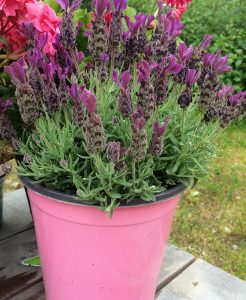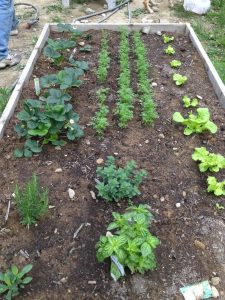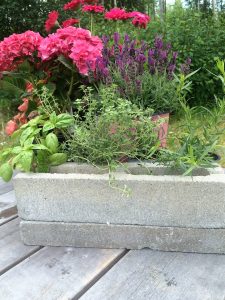Pest Control from a Different Angle
As we all know, gardening in Alaska can be difficult. Aside from the short growing seasons with, sometimes, extreme weather conditions, Alaskan gardeners, must contend with a variety of pests. Whether it’s moose or insect invaders “die-hard gardeners” have developed a host of unique solutions to combat them.

When we think of pest control our main focus has been on protecting our plants. But seldom do we think of garden plants as potential front-line defenders against the pest that makes visiting the garden less than delightful, the mosquito.
“This repellency of plant material has been exploited for thousands of years by man, most simply by hanging bruised plants in houses, a practice that is still in wide use throughout the developing countries” [1][a]
With mosquito borne illnesses appearing in the headlines more frequently; curious gardeners may be interested in experimenting with mosquito repellent plants. Beyond being just a nuisance, mosquitoes can– and in some areas–do, pose certain health risks.With these ever increasing concerns, coupled with environmental issues, I was motivated to plant my own mosquito repellent garden this year.
Plant Selection
I selected plants based on availability and ease of growing. There are numerous articles online discussing or advertising mosquito repellent plants. The articles range from “Top Ten” plant lists to academic papers focused on topically applied, plant-based extracts and essential oils. Additionally, there is wide variation among many plant lists on which plants are most effective.
Though few plants cited in the “Top Ten” lists were used in clinical trials and none were used in their natural, unprocessed state, there were several plants used by both – in different forms. These included Citronella [1] and Lemon Eucalyptus. However, neither of the plants were available in my area. Instead, I proceeded with locally sourced herbs commonly extolled as mosquito repellent plants.
Some of the Frequently Cited Mosquito Repelling Plants
- Lavender
- Mint
- Catmint
- Rosemary
- Citronella Grass
- Chives
- Basil
- Tarragon
- Lemon Balm
- Lime Basil
Herbs are wonderful plants with many uses.
Not only are herbs a culinary must have, they have been routinely used for centuries, by nearly every culture, for their numerous health benefits.
They are easy to grow, maintain and can be integrated into many landscape designs. Whether planted as borders around raised beds or layering them throughout flower and vegetable gardens, their texture and unique scents can add appeal to just about any setting. Additionally, potted herbs make beautiful additions to patio seating areas and can be placed as center pieces on outdoor table tops, where their “potential” repellent qualities and their fragrance can be appreciated most.
Putting Repellent Plants to the Test
My raised bed garden is situated on a narrow strip of land, closely, bordered by marshy swamp to the north and birch woodland to the south – both prime mosquito habitat.

Around each bed I planted a variety of herbs: two basil, thyme, and rosemary plants and three chives. While they thrived and grew abundantly, so did the mosquitoes. There was no noticeable repellent properties with these herbs and I resorted to citronella coils and spray. However, I believe that it is possible the sparse quantity of plants may have had little affect against natural environmental factors.

Closer to home, on my patio picnic table, I placed potted: tarragon, rosemary, thyme, basil, and lavender. There was a slight reduction in mosquitoes in the immediate seating area, however, this was not significant. Again, other environmental factors may have influenced this, as the patio area is not prime mosquito habitat, being hardscaped with concrete pavers and limited brush and grass.
Conclusion
While I do feel herbs are beneficial to the gardener, in their non bruised, natural state, they cannot be relied on solely for pest management, in regards to mosquitoes. Many factors must be considered, such as plant variety, location and quantity.
Pest management may require a layered approach with understanding of individual environmental factors coupled with knowledge of pest biology and cycles.
There is a wide availability of literature and resources online regarding natural pest control and I would encourage all home gardeners to develop and use an integrated pest management (IPM) program–available to Alaskans from UAF Cooperative Extension Service.
Despite the hype, the herbs I used in their non bruised form, did not perform as adequate mosquito repellent and I was required to use commercial products to alleviate them. Having said that, I would still encourage every gardener to explore different varieties of plants and test their effectiveness for themselves. After all, aside from blood, you have nothing else to lose!
[1] (Under background discussion) Plant-based insect repellents: a review of their efficacy, development and testing ©2011 Maia and Moore Biomed Center, Ltd ](https://www.ncbi.nlm.nih.gov/pmc/articles/PMC3059459/)
- [a] Moore SJ, Lenglet A, Hill N. In: Insect Repellents: Principles Methods, and Use. Debboun M, Frances SP, Strickman D, editor. Boca Raton Florida: CRC Press; 2006. Plant-Based Insect Repellents.
About dgleaso4
I am a beginning to intermediate gardener, living in South Central Alaska, residing on ten acres of coastal land in Point Mackenzie with my family of five and numerous pets.
My interests have been, until recently, focused on native plants. However, as a student of the Alaska Master Gardeners Course, I hope to expand my knowledge and diversify into the vast verities of plants available for cultivation.
Twitter •
Did you notice a difference if you brushed the plants to release the scent? My understanding is that it is the scent that will help deter the mosquitoes! Generally, the plant on its own doesn’t release much scent, it relies on wind or creatures brushing it. I think you’re on to something with the sparseness of your test plants…it would probably take quite a few to make a difference if you have prime mosquito territory! Did you try rubbing the leaves on your skin? That can help keep the mosquitoes from landing, even if they are still buzzing around you!
We have some marigolds in pots on the deck. The kids brush against them when the go out to play. Not sure how much it is helping, as we have a horrible batch of skeeters this year (and the kids roam away from the deck), but it sure smells nice!
Hi Cathy, you’re absolutely right, herbs in their whole form, provided little protection, thus requiring bruising of the leave to release their oils. I generally rub a leaf, out of habit, on my skin while gardening. However, my location is really wild and having a stagnate water source near by doesn’t help. I’ve tried to encourage dragonflies to reproduce as they are a natural predator of mosquitoes. Let me know if you have any suggestions, or home solutions that have worked for you.
Funny that I am reading this today. I was out weeding my flowerbed today and had to quit because I was being eaten alive! I promptly went to Fred’s and bought 2 large citronella candles! I plan to add some of the herbs on your list next year!
I think this is a really interesting article. Something like this would also make an excellent science fair project for a young person!